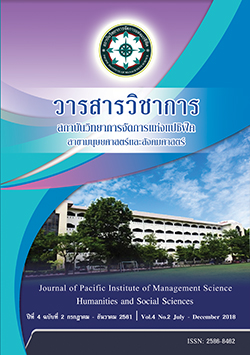Human Resource Development Innovation Affecting Hotel Business Success in 3 southern border provinces
Keywords:
Innovation, Human Resource Development, Hotel Business, 3 Southern Border ProvincesAbstract
The research aims to: 1) to study the variables of innovation in human resource development that affect the success of hotel business in the three southern border provinces; 2) to study the relationship of innovation variables to human resource development that affects the success of 3) Hotel business in 3 southern border provinces 3) To create human resource development innovation that affect the success of hotel business. 3 provinces The quantitative and qualitative research. The sample used in quantitative research was Hotel operators in the three southern border provinces, 420 people, by the size of the sample from the Observation Variable in the ratio of 1 to 20. The tool used to collect data is the questionnaire. For qualitative research The sample was Hotel operators in the three southern border provinces were randomly selected from 15 randomly selected hotels. The instrument used for data collection. This is an in-depth interview and confirms the data using the three statistical theories used in the data analysis: descriptive statistics, percentages, means and standard deviations. The researcher used Mixed Methodology as a quantitative research. (Quantitative Research) using the Structural Equation Model (SEM) technique to fulfill the research objective 1 and the qualitative method using interview technique. Content Analysis in response to research objective 2 and presentation of human resource development innovations that affect the success of hotel business in 3 tea provinces. The southern to meet the research objective 3, the results showed that the knowledge ability. Innovative Human Capital Capacity management, leadership and teamwork. Direct influence on the success of a business hotel. The coefficient of influence was .63, .40, .48, .30 and .40, respectively, at the .05 level of significance. There is no direct influence on the human resources development that has contributed to the success of the hotel business in the three southern most provinces. All the causal variable Can describe the variance or predictability of 86%. In addition, qualitative research also found that the security of the customer. To stay Can build confidence and loyalty to return service. This has resulted in the success of the hotel business as well.
References
Almajali, D. A., Masa’deh, R., &Tarhini, A. (2016). Antecedents of ERP Systems Implementation Success: A Study on Jordanian Healthcare Sector. Journal of Enterprise Information Management, 29(4), 549-565. http://dx.doi.org/10.1108/JEIM-03-2015-0024
Al-Sarayrah, S., Obeidat, B.Y., Al-Salti, Z., &Kattoua, T. (2016). The Effect of Culture on Strategic Human Resource Management Practices: A Theoretical Perspective. International Journal of Business Management and Economic Research,
Altamony, H., Al-Salti, Z., Gharaibeh, A., &Elyas, T. (2016). The relationship between Change Management Strategy and Successful Enterprise Resource Planning (ERP) Implementations: A Theoretical Perspective. International Journal of Business Management and Economic Research, 7(4), 690-703.
Alireza Nazarian , Peter Atkinson , PanteaForoudi (2017) Influence of national culture and balanced organizational culture on the hotel industry’s performance International Journal of Hospitality Management
Alsughayir, A. (2014). Human resource strategies as a mediator between leadership and organi-zational performance. International Business Research, 7(3), 91-100. doi:10.5539/ibr.v7n3p91
Ali Hussein Alkahtani. (2015). The Influence of Leadership Styles on Organizational Commitment: The Moderating Effect of Emotional IntelligenceOnline Published: October 10, 2015
Anamaria, R., & Maria-Cristina, I. (2013). Consumers' perception on innovation in the tourism value chain. Annals of the University of Oradea, Economic Science Series, 22(1), 815-824. Retrieved from http://anale.steconomiceuoradea.ro/en/
Anca-Ioana, M. (2013). New approaches of the concepts of human resources, human resource management and strategic human resource management. Annals of the University of Oradea, Economic Science Series, 22(1), 1520-1525. Retrieved from http://anale.steconomiceuoradea.ro/en/
Downloads
Published
Issue
Section
License
บทความที่ได้รับการตีพิมพ์เป็นลิขสิทธิ์ของ สถาบันวิทยาการจัดการแห่งแปซิฟิค
ข้อความที่ปรากฏในบทความแต่ละเรื่องในวารสารวิชาการเล่มนี้เป็นความคิดเห็นส่วนตัวของผู้เขียนแต่ละท่านไม่เกี่ยวข้องกับสถาบันวิทยาการจัดการแห่งแปซิฟิค และคณาจารย์ท่านอื่นๆในสถาบันฯ แต่อย่างใด ความรับผิดชอบองค์ประกอบทั้งหมดของบทความแต่ละเรื่องเป็นของผู้เขียนแต่ละท่าน หากมีความผิดพลาดใดๆ ผู้เขียนแต่ละท่านจะรับผิดชอบบทความของตนเองแต่ผู้เดียว







